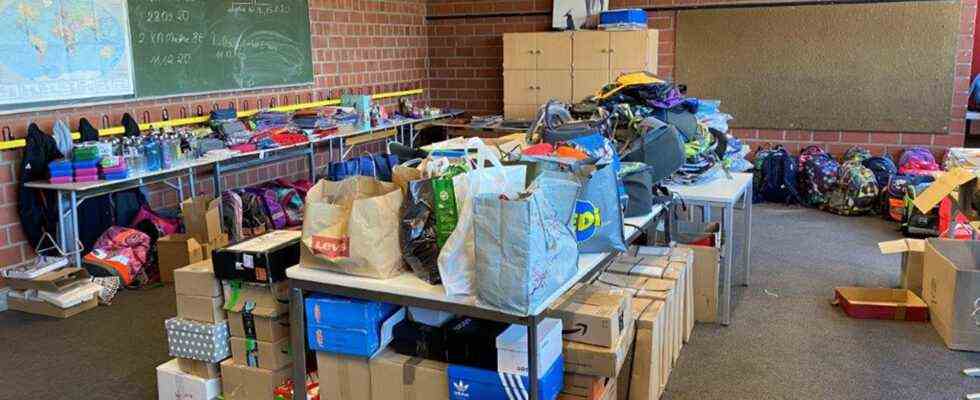Status: 08/29/2021 5:10 a.m.
The devastating masses of water in the Ahr valley have also destroyed or damaged numerous schools. Now classes start again on Monday – and little is normal.
Even before the headmistress Doris Stutz tells how the new school year is going after the flood disaster in the Ahr valley, she wants to say something: “Our school was very lucky that we did not have to mourn any deaths.” The teacher at the Alfred-Kästner-Realschule in Bad-Neuenahr-Ahrweiler almost got tears in her eyes. “We have 53 families at our school who have lost everything, who have had to move out of their homes. We don’t know how many of the children come back from it. Many said they want to.” So far, 320 students have attended the school. Stutz knows them all personally.
In the middle of the flood area: The Erich-Kästner-Realschule in Bad Neuenahr
Image: Erich-Kästner-Realschule Bad Neuenahr
Many schools damaged
The school building is around 100 meters from the Ahr. On the night of July 15, 2021, the ground floor was completely flooded. “Except for the ceiling, everything has been destroyed,” says the headmistress. The teachers’ room, administration rooms, library, student toilets and specialist rooms, including a science room “with safety cabinets for chemicals”, were located on the ground floor. It was only put into operation a year ago.
The sanitary facilities also have to be completely renovated.
Image: Julia Schifferings / SWR
According to the Ministry of Education in Rhineland-Palatinate, around 40 schools across the country were damaged by the flood. 19 schools are so badly damaged that they cannot be used at all or only to a limited extent. According to initial estimates, the damage is in the three-digit million range. Container solutions have been found for some schools, others can use the premises of other schools.
Helpers from all over Germany
Even if her school is like a construction site – headmistress Stutz is happy that the lessons can take place again, at least to a limited extent. She emphasizes again and again that this would not have been possible without the help and support of countless helpers from all over Germany. She and many of her colleagues also worked through the summer vacation. 80 people came specially with a bus from Münster to remove the screed.
Headmistress Stütz is grateful for all the help with the renovation.
Image: Julia Schifferings / SWR
“No screed noise during school days”, that was particularly important to the headmistress. “We are further than others.” The windows or what is left of them are currently being removed. “A little construction noise can be tolerated,” says Stutz. Many of the unusable rooms are separated by wooden walls.
Colorful school bags as donations
In one of the upper classrooms, many colorful school bags are lined up next to each other, filled with everything that students need: pens, notepad, fountain pen, calculator, drinking bottle. “They are for the children who lost theirs in the floods,” says the headmistress. They are donations from companies and private individuals. In addition, every affected family received a sum of money from the school and support from helpers.
There were many donations for children who no longer have school supplies.
Image: Julia Schifferings / SWR
In another classroom, two teachers are setting up a new reading corner. They have “received a lot of book donations,” says teacher Caroline Rheinbei. “There wasn’t enough space for a separate room.” Nevertheless, they want to create as much normality as possible for the students.
The teachers who paint shelves blue in a room next door try to do the same. According to the headmistress, the room should look homely for the new fifth graders. “Since all the rooms on the ground floor that make up the school have been lost, we want to make the classrooms as comfortable as possible here.”
Vacation meets disaster
The headmistress believes that the biggest problem will be Monday when the children come back. “Then the children who were able to go on vacation normally meet those who were stolen by the flood.” There will be a big discrepancy, “she fears. Bringing these contrasting experiences together into a class community will be the challenge.
The school should be as comfortable as possible for the children.
Image: Julia Schifferings / SWR
In the first week, therefore, the focus is not on normal lessons, but on coming together, exchanging ideas and working through them together. Headmistress Stutz made sure that the class teachers lead the lessons, supported by colleagues and other educational staff. A school psychologist will also be on site. “If there are tears in a class, he’s there and the kids can go to him whenever they want.” She is also happy that the school has a social worker with a dog. “That too will certainly be in great demand in the next few days.”
Challenge way to school
Another challenge is the way to school, says Stutz. In the past, children were brought in 31 buses. With the many bridges still destroyed, that couldn’t work. The headmistress therefore relies on the parents “There will have to be a lot of mom taxis”. In addition, there will be an open start of lessons – at least at the beginning.
According to its own information, the responsible ministry in Rhineland-Palatinate for climate protection, energy, the environment and mobility has already discussed in several rounds with the Zweckverband Eisenbahn Personenennahverkehr Nord (SPNV), the local transport associations and the school authorities how school bus traffic can be set up after the summer holidays. Therefore, replacement transports to the individual school locations would be organized.
The headmistress hopes that after the first week at the latest, lessons can be held according to a normal timetable. Nevertheless, students, parents and teachers are happy that they can even offer lessons again as a school.

